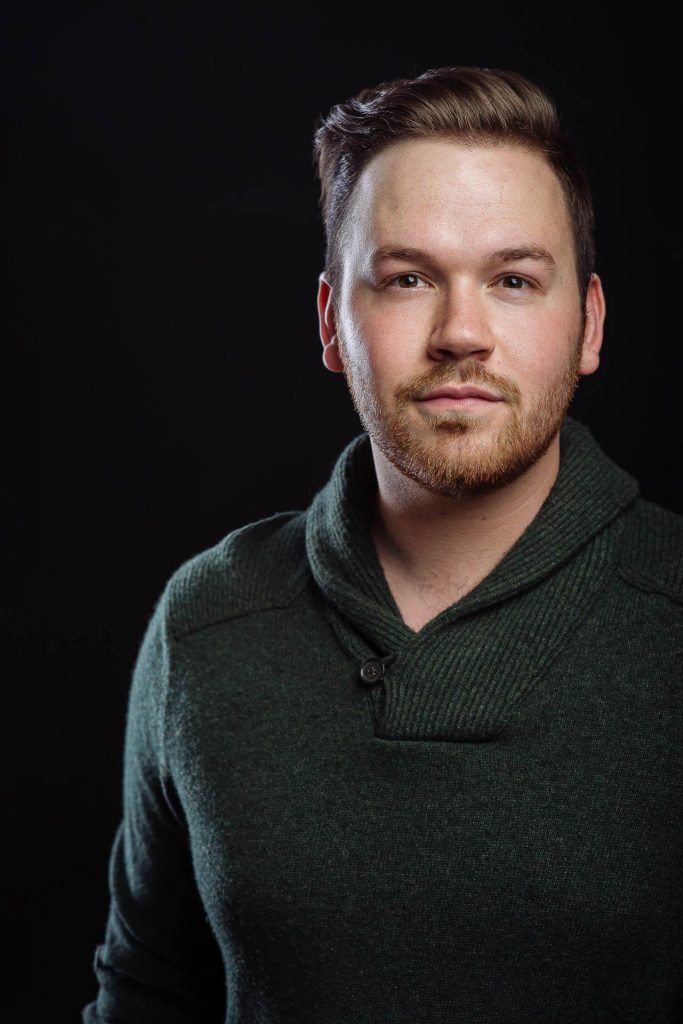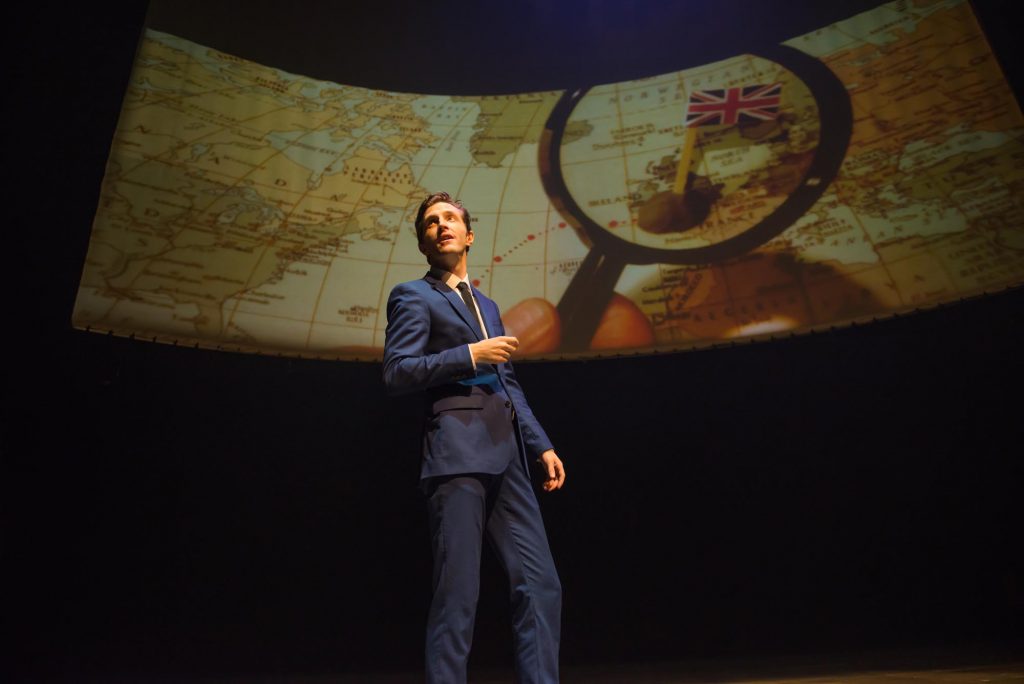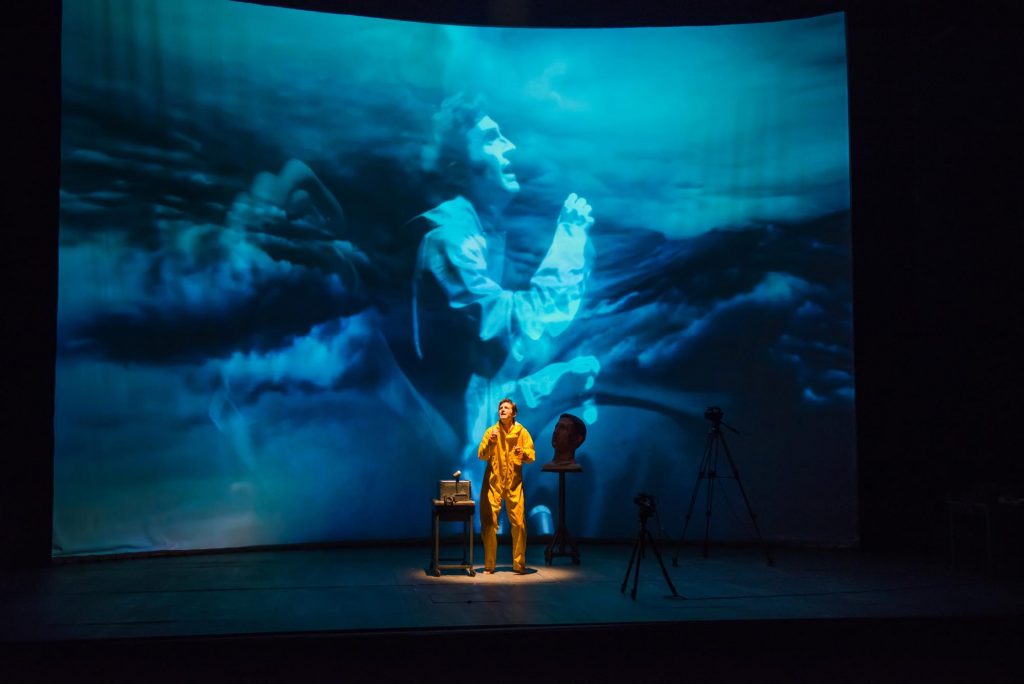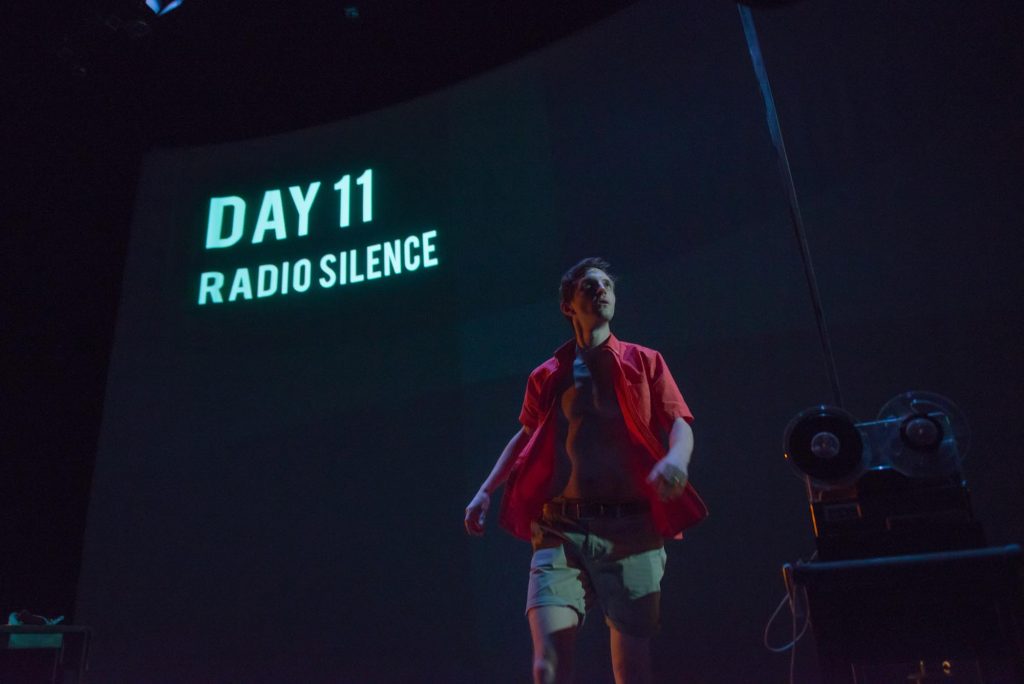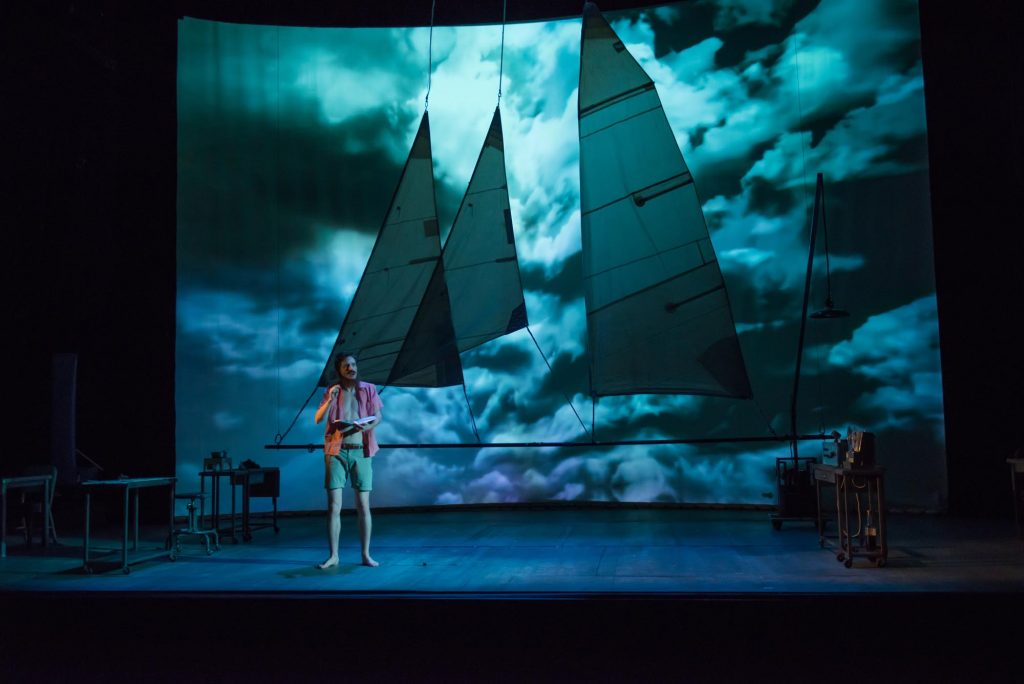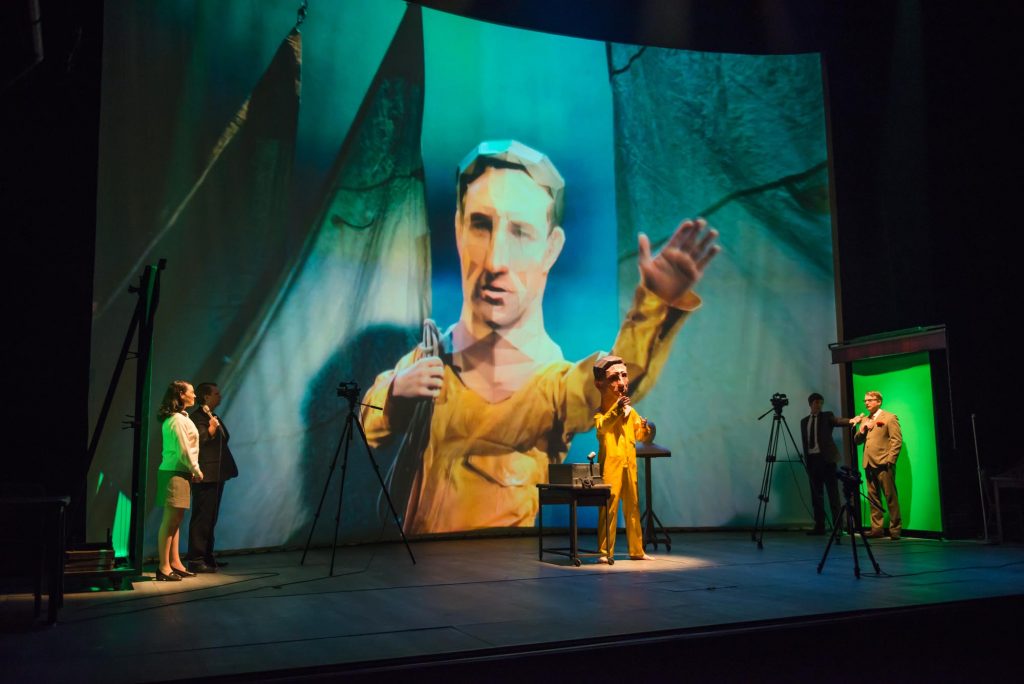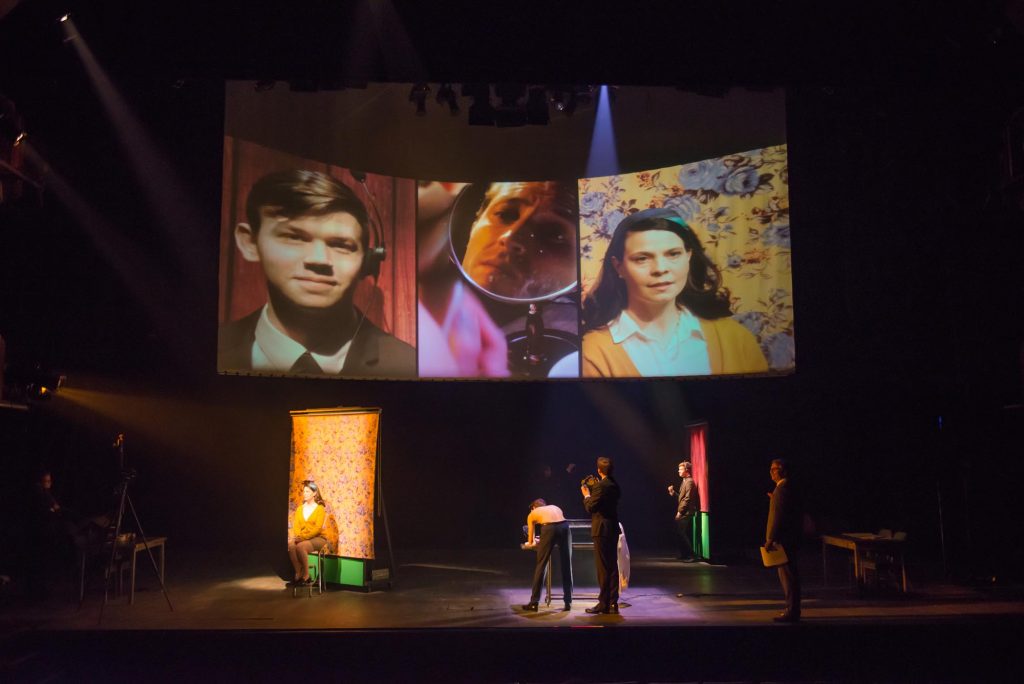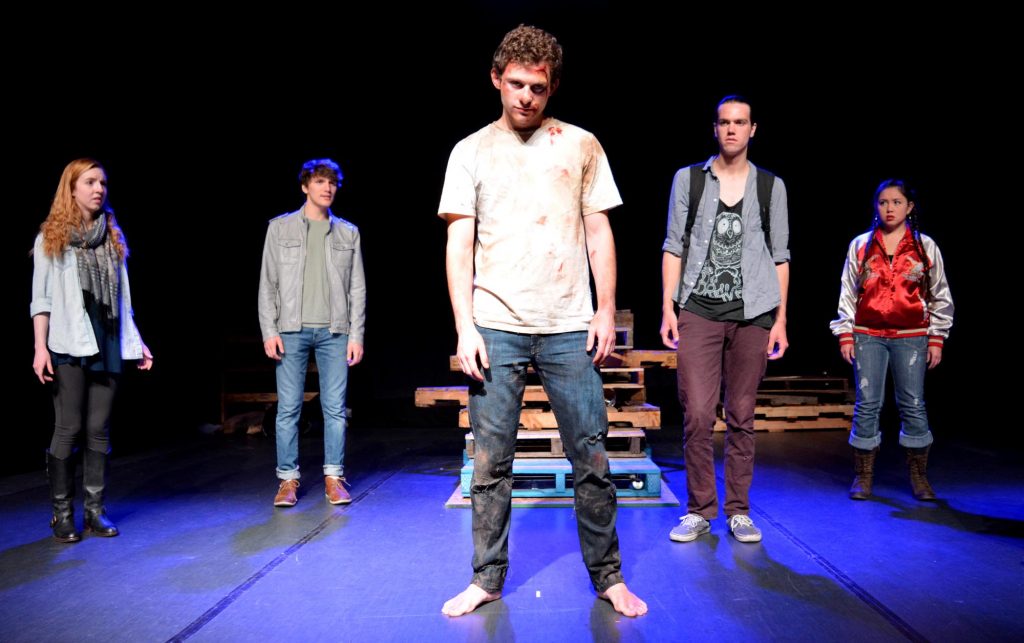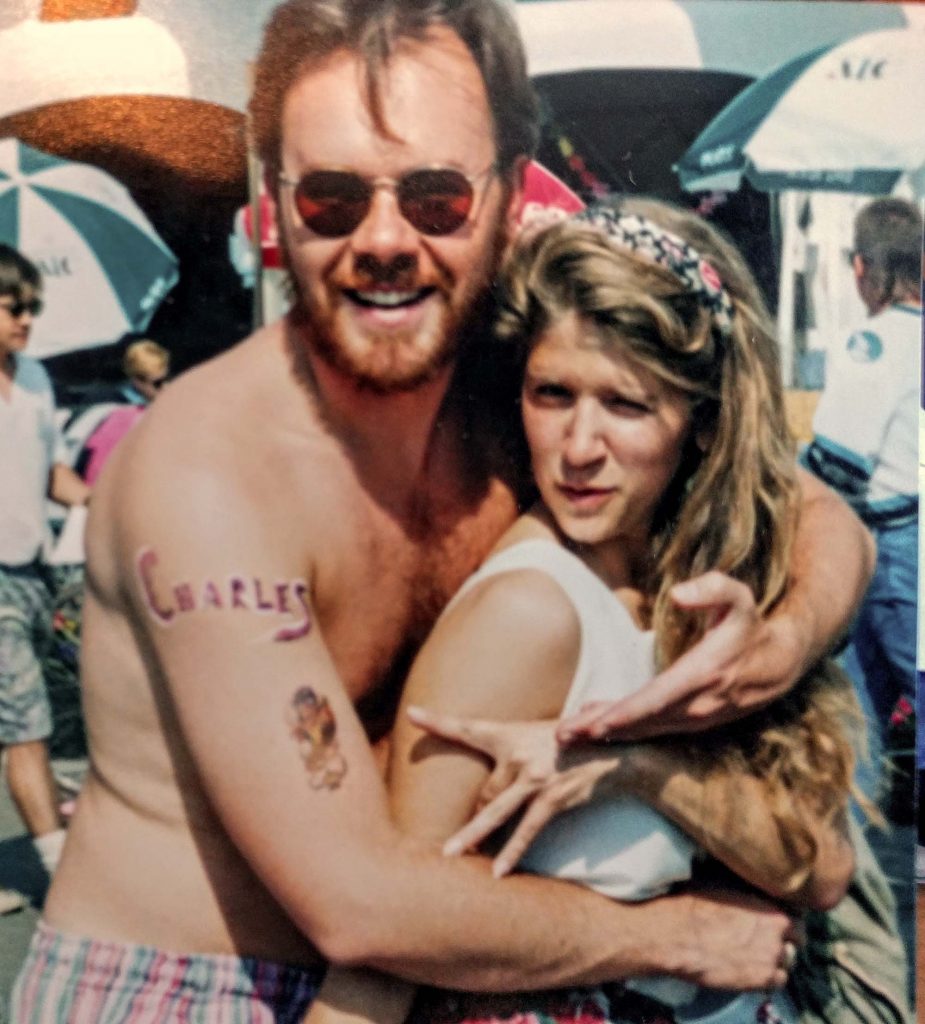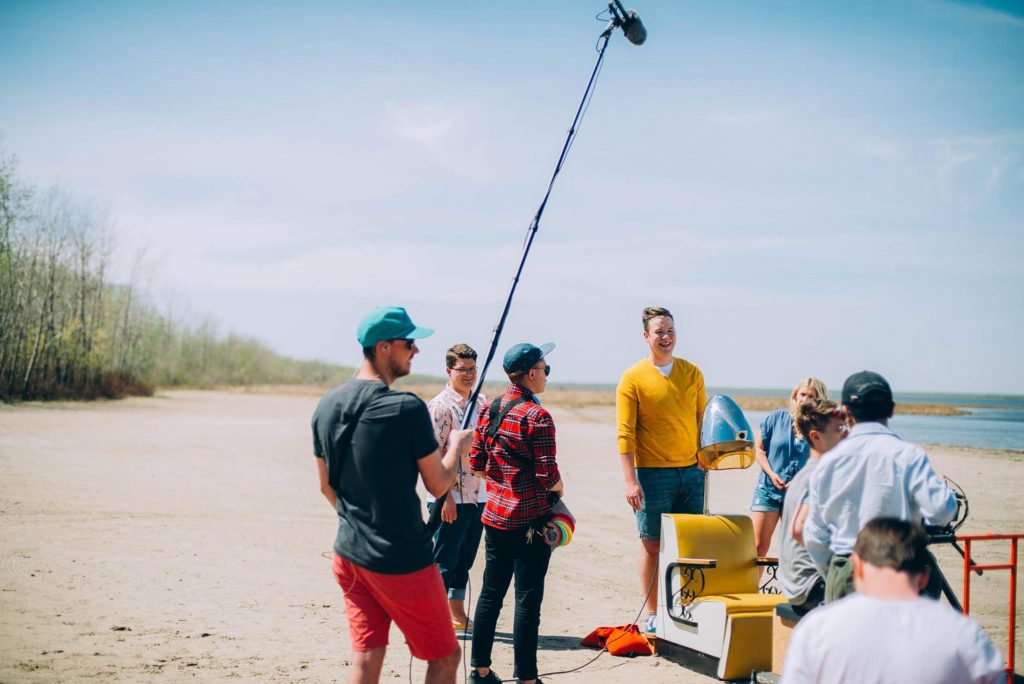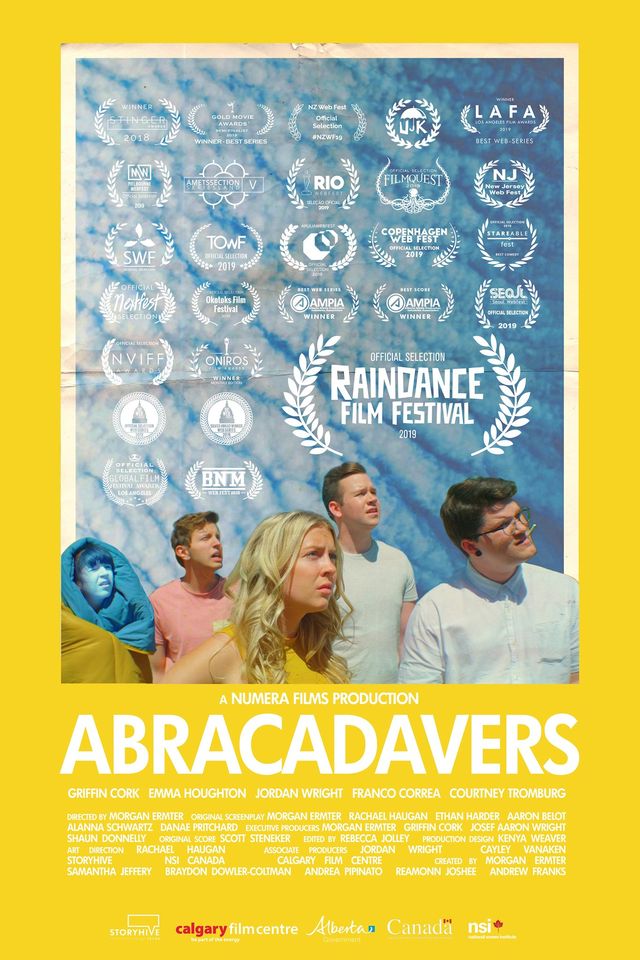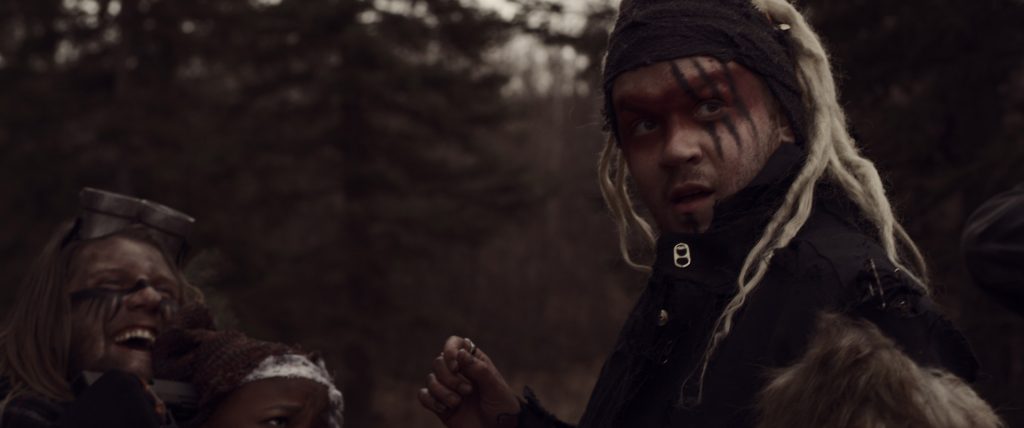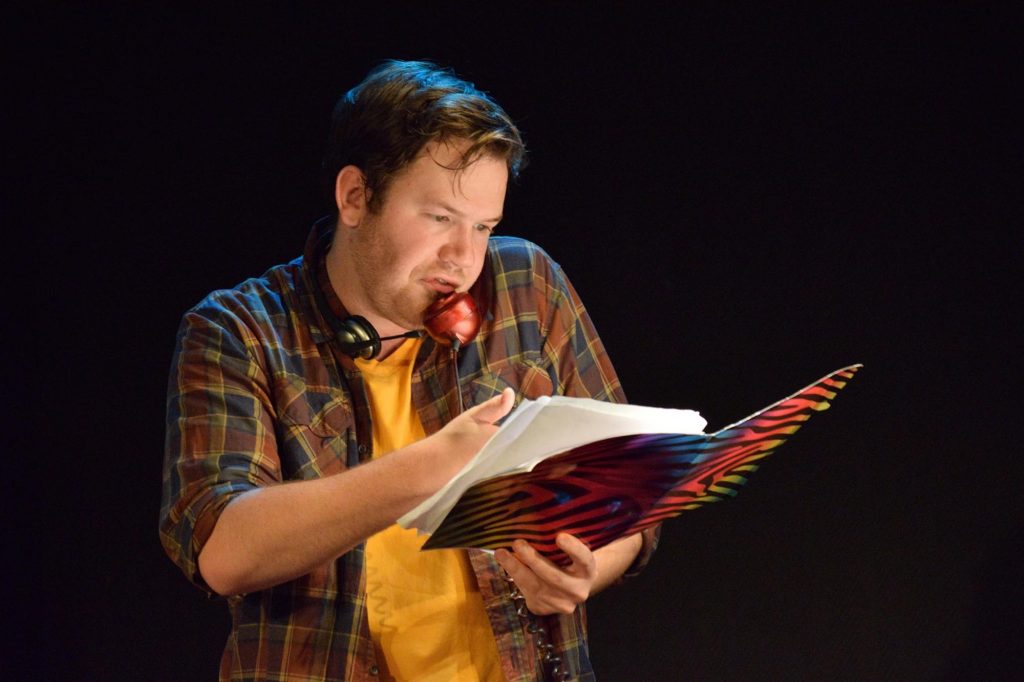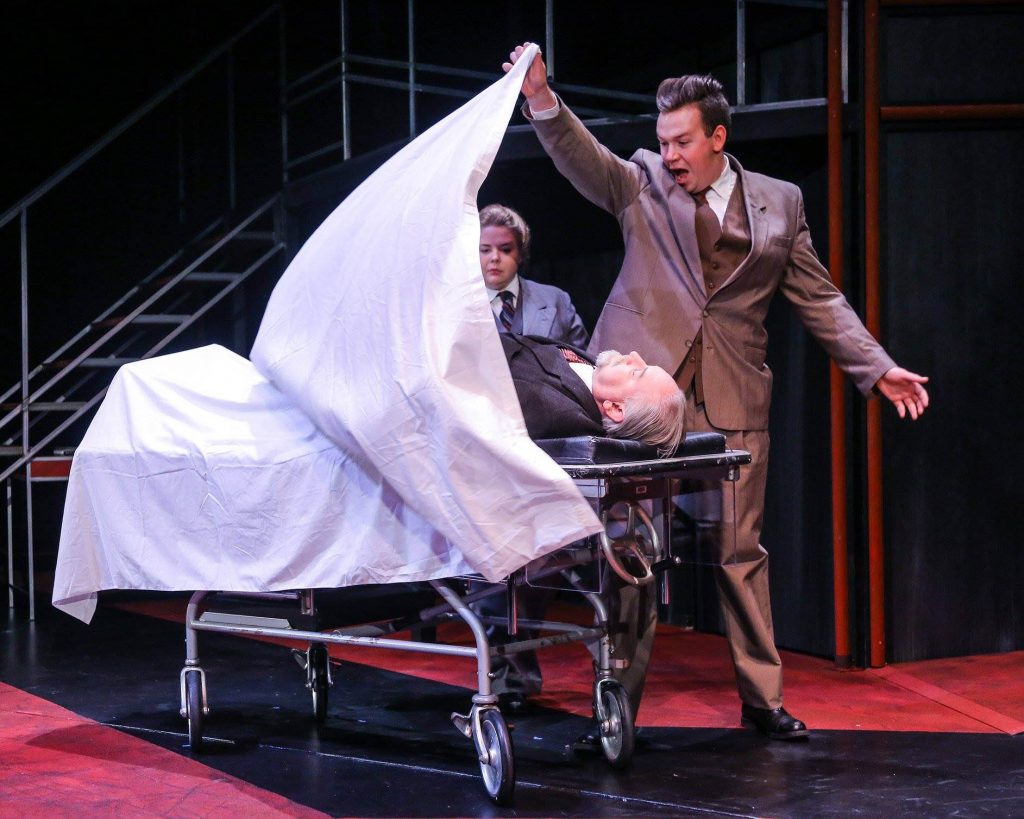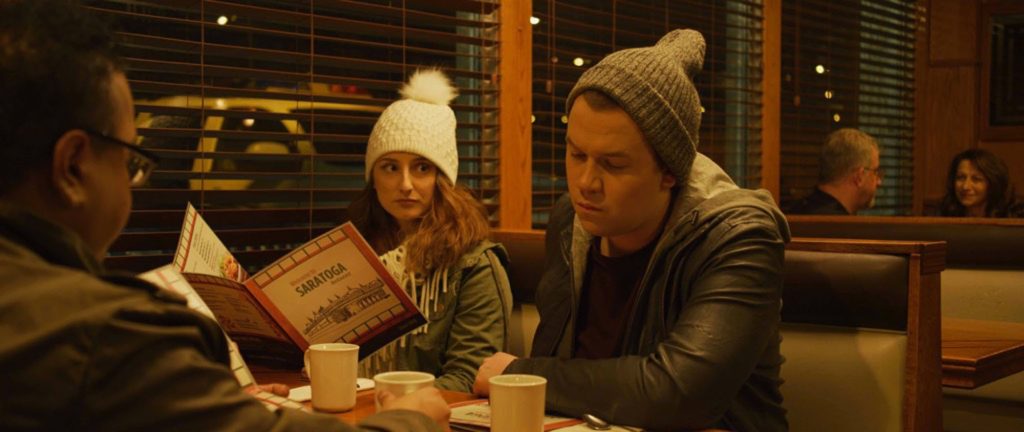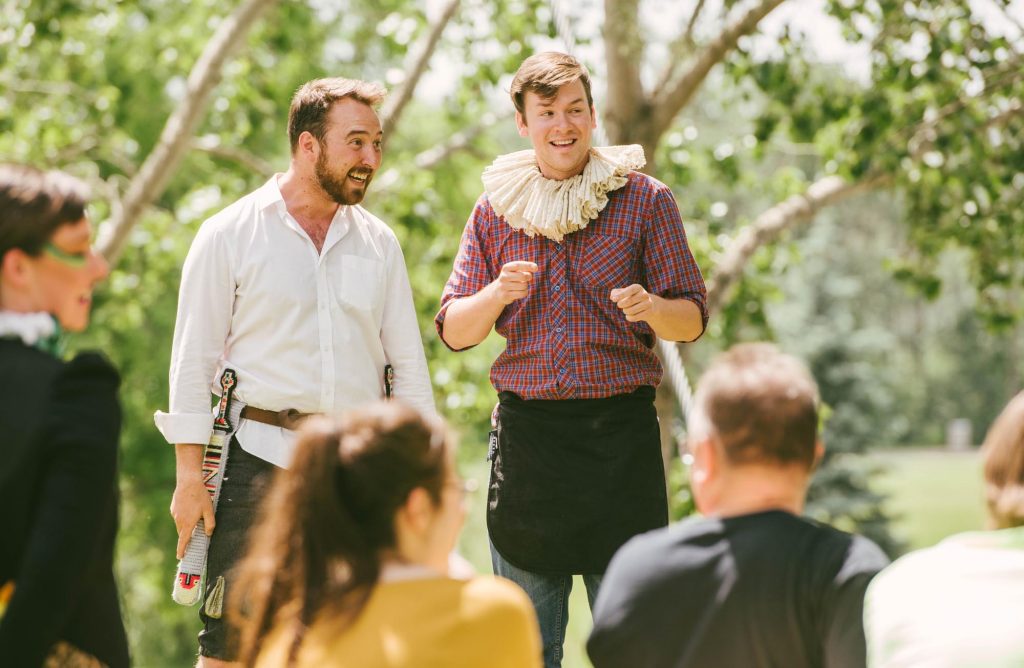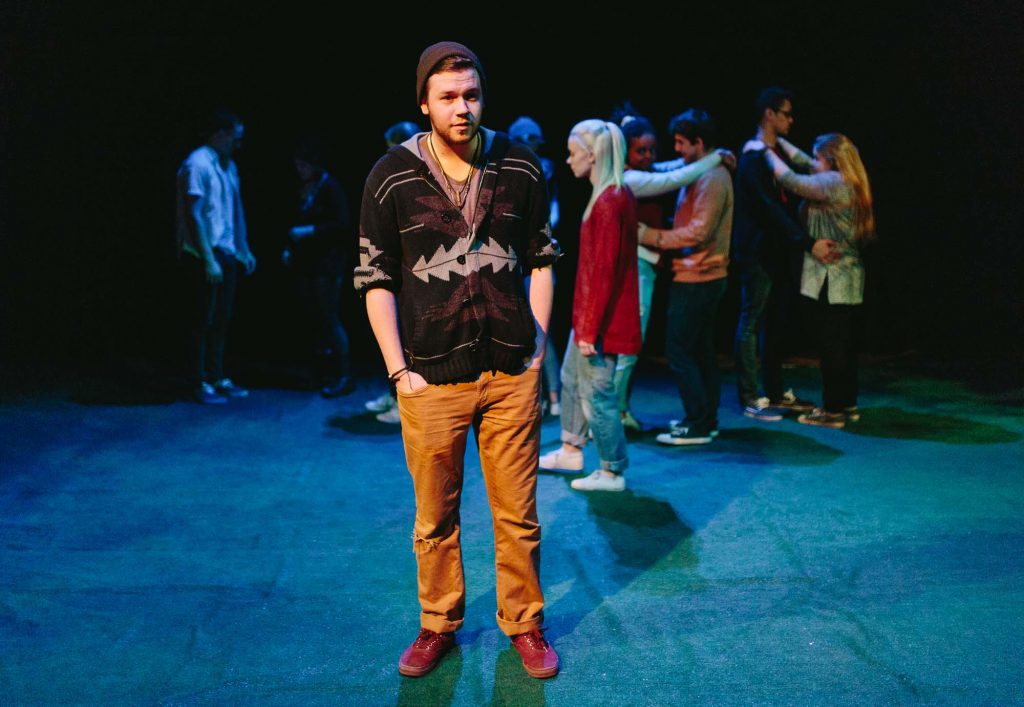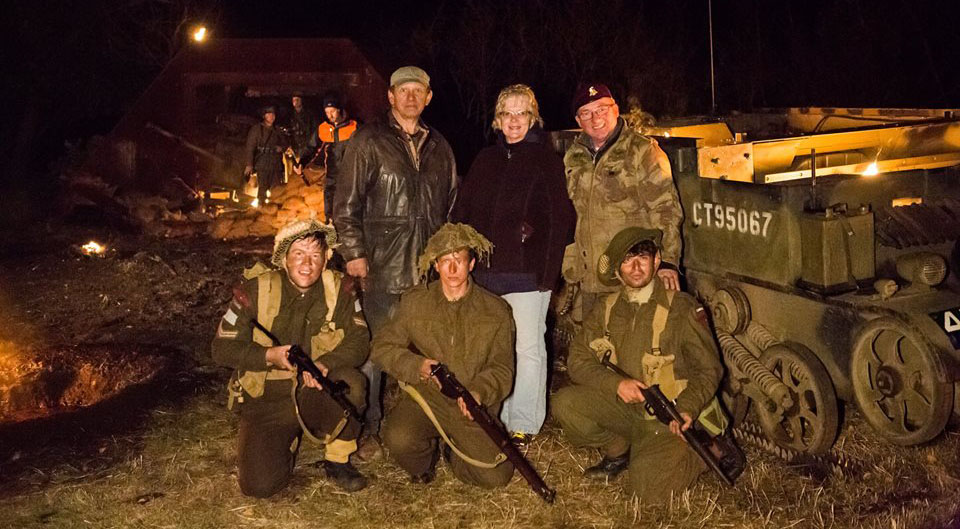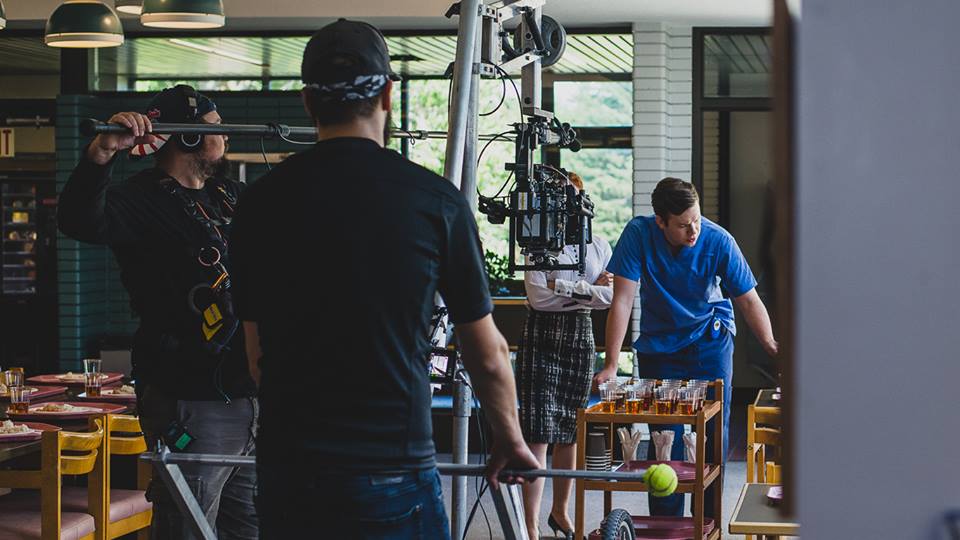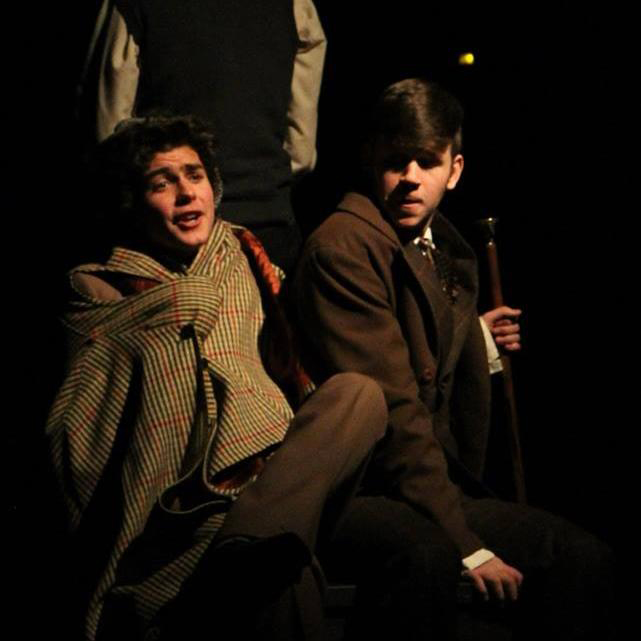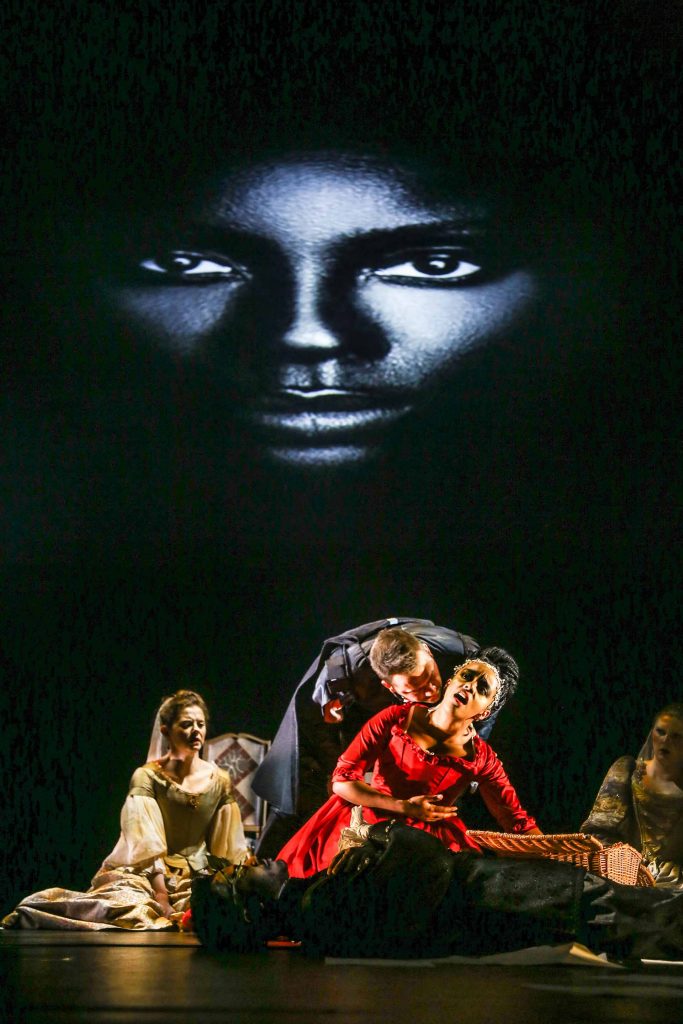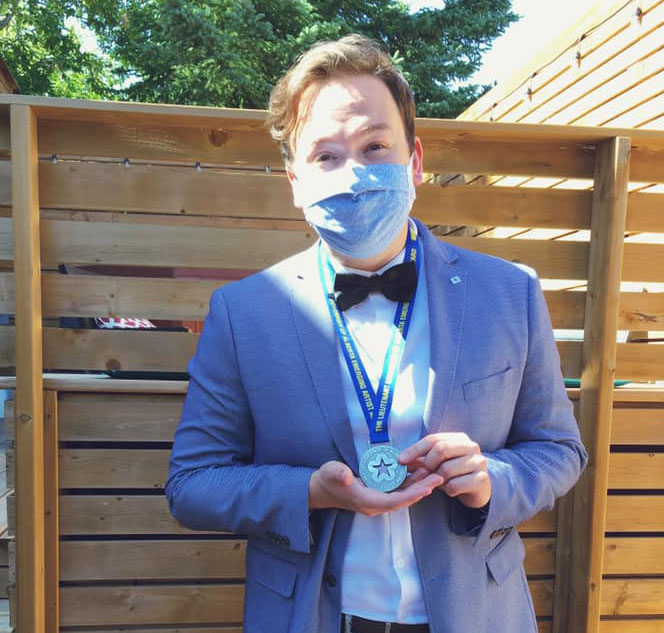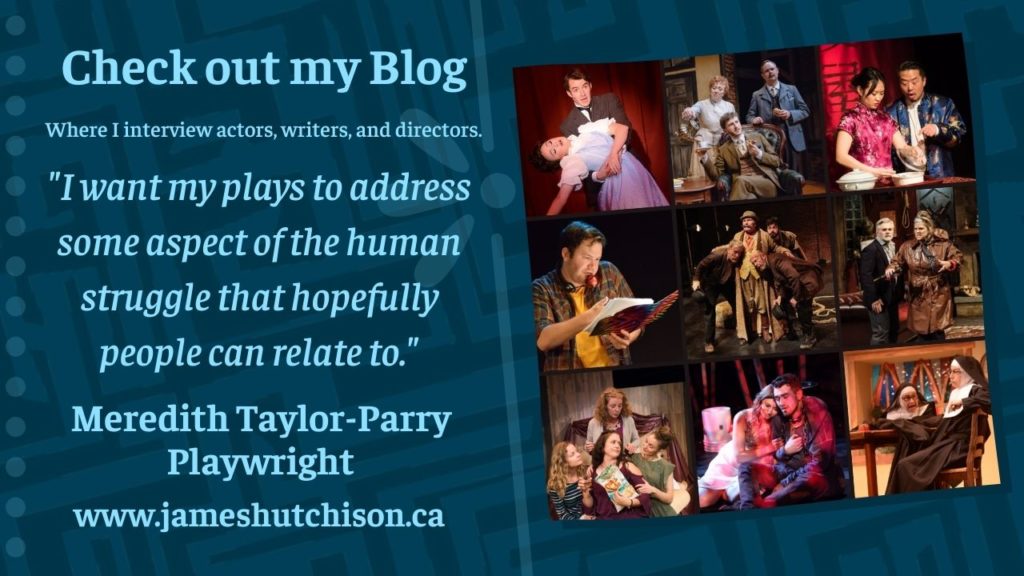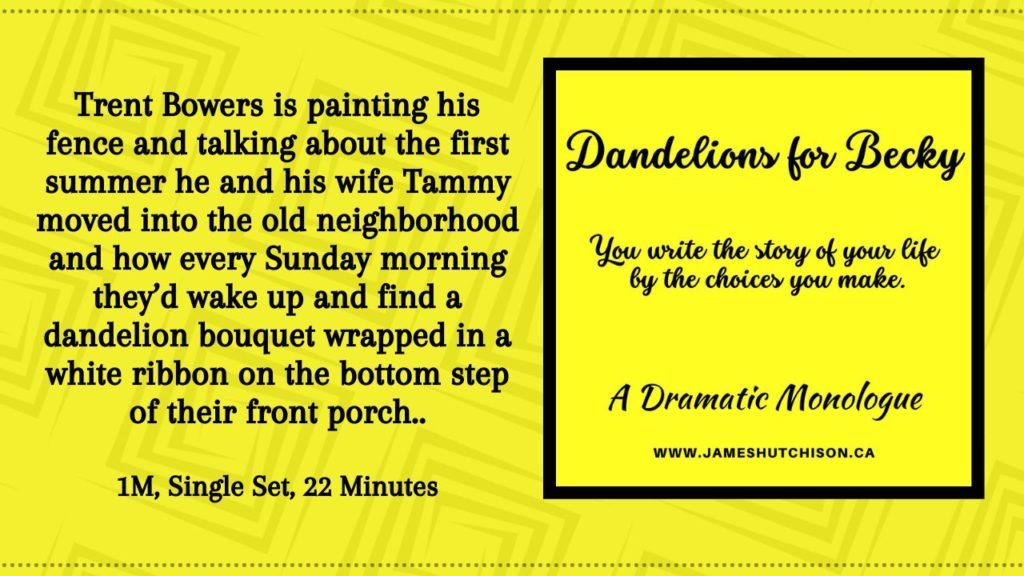A year ago Juliet Liraz a senior Correctional Substance Abuse Counselor produced an inmate-run production of my adaptation of A Christmas Carol in the Department of Corrections in the state in which she lives. This blog is the story of that production, and it contains an account of the production in Juliet’s own words. It contains an interview I did with Juliet in November to talk with her about the production and her work with the Department of Corrections. And it contains two stories, one from Group Facilitator McCoy and one from Group Facilitator Kibeon, about their experience helping to produce A Christmas Carol.
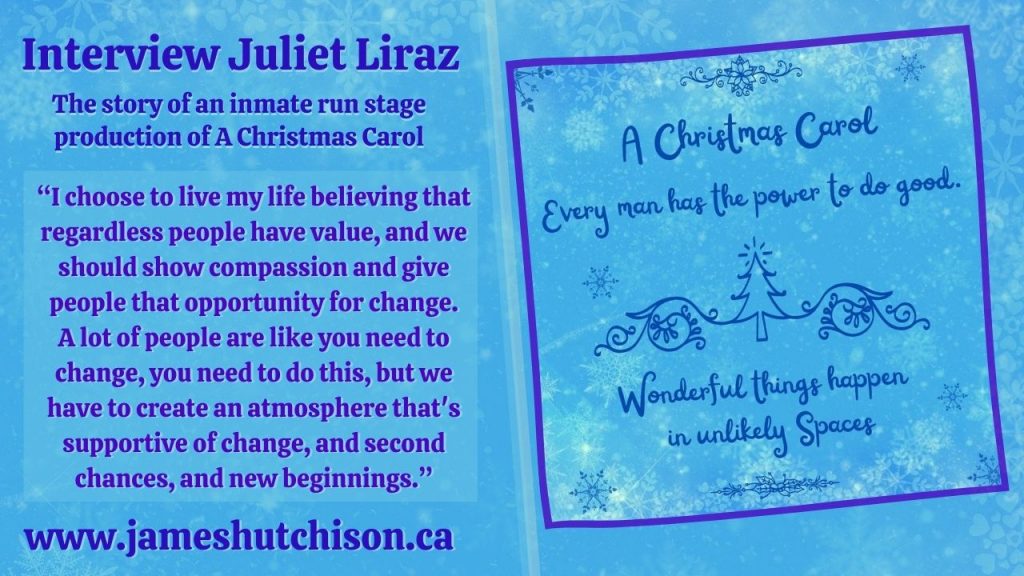
“And in the play when Scrooge went back in time and saw the love of his life and saw how he just pushed her away because he was Scrooge and he was a young man and he’s just making these choices and they’re yelling – the inmates in the audience they’re yelling, “Don’t do it Scrooge!” because as they’re watching that scene they see themselves. They see those pivotal moments in their life where they know they should have gone left, but they went right. And the actor playing Scrooge did such a great job of showing how this horrible belligerent nauseous person just transforms into this carefree young man, and for the audience it was reliving those moments in their lives and seeing what could happen in their own lives if they made a change. It was really magical.”
Juliet Liraz
“The next few days of preparation were a comedy of errors. Murphy’s law really does exist! What kept us alive and motivated was Ms. Liraz’s belief in us. After years of conditioning, many inmates begin to believe that they are not worthy, not deserving, not trustworthy, stupid, naïve, crooked, and incapable. When someone simply believes in and validates us, we want to give them everything we have.”
GF Kibeon
“A counselor who went to both performances was amazed. She normally doesn’t go to any inmate thing. The experience of doing the play opened people up to our program and the need for an outlet for their feelings. Many people now wanted to participate in the next thing. After being able to do a play in 5 days, we were beyond cocky. All of the GF’s figured if we had a month we could do anything.”
GF McCoy
When I interviewed Juliet to talk with her about the production of A Christmas Carol she mentioned a Nigerian novelist by the name of Chimamanda Ngozi Adichie who talks about the danger of a single story which basically means if we only have a single story about another person or another country we run the risk of misjudging that person or that nation.
“The single story creates stereotypes, and the problem with stereotypes is not that they are untrue, but that they are incomplete. They make one story become the only story. Show a people as only one thing, over and over again and that is what they become.
The consequences of the single story is this: It robs people of their dignity. It makes our recognition of our equal humanity difficult. It emphasizes how we are different rather than how we are similar.
Stories matter. Many stories matter. Stories have been used to dispossess and to malign, but stores can also be used to empower and to humanize. Stories can break the dignity of a people, but stories can also repair that broken dignity.”
Chimamanda Ngozi Adichie – The danger of a single story – TEDGlobal July 2009
And so that’s one of the reasons I wanted to tell this story about the production of A Christmas Carol. It’s not the sort of story you often hear in regard to prison life and for that reason alone it deserves to be told. And what this story revealed to me is how our actions and decisions have consequences that touch many lives and ripple through time. That’s why it’s important to remember that each of us has the power to do good based on how we treat others and live our lives.
Juliet Liraz’s Reflections on A Christmas Carol
“And that’s when the idea arose of producing a Christmas play.”
I was hired by the Department of Corrections shortly after I acquired my counseling license. I had worked with DOC as a teacher while finishing graduate school, and I was excited to serve in a different capacity.
The winter holiday season is a difficult season for many people and especially for incarcerated individuals. I’d heard stories about how this was the most trying time of the year, so I had asked for and received permission to decorate the building for Christmas.
Decorating the building seemed like a small gesture. However, what I’ve learned toward the end of my time in Corrections, is that small gestures have a long-lasting impact. They teach you about this while you’re in training; however, it’s connected towards negative outcomes such as staff smuggling dangerous contraband into the prison. Negative outcomes do happen, absolutely, but so do positive ones.
I started decorating with a few volunteers. The counselors work alongside inmates certified as Group Facilitators. A few of them helped me decorate the building while groups were in session. We received a lot of wide-eyed stares, and soon, with the approval of the other counselor, my small crew of volunteers expanded. Anyone watching the scene would have seen a group of tatted up convicts, from varied backgrounds, taping garland across the ceiling. I couldn’t have asked for a better group of volunteers. Together, we created a Winter Wonderland.
I was taken aback by how heartwarming the experience was. Again, I thought nothing of decorating the space. According to my logic, it was no big deal. However, I was never so wrong. Many of the volunteers have never decorated for the holiday, and for various reasons, absolutely dreaded the season. For many, it’s the worst time of the year. The volunteers told me and the other counselor that they felt renewed, happy, and hopeful. The energy in the building was jubilant.
And that’s when the idea arose of producing a Christmas play. I was talking with a GF in my office at the end of the day, and during our conversation, he’d mentioned that he had never seen a play before, and I blurted out, “Hmm…what if we do a play here? A Christmas play?” The idea quickly took root, and my mouth started moving a mile a minute. While teaching, I had my students write original screenplays to satisfy a writing requirement, and they performed their pieces in front of a small audience. But THIS, this could be on a grander level! This could be a unit-wide production! We could have auditions, rehearsals, props, music, and after a brief period of frenzied babble, I finished with, “What do you think?”
Baffled at the sudden and intense turn of events, the GF stammered, “I don’t know.”
I called another GF into my office and told him my idea. As I spoke, several emotions flashed across his face, and after a lengthy pause, he agreed that it was something that was feasible – with permission – and the production might be a wonderful farewell to the retiring Deputy Warden who had a history of supporting inmate rights. It would be a testament to her legacy. We notified the other GF’s to get their feedback. They were caught off guard, nervous, excited, confused, and did I mention, nervous? But we had a plan, we would perform A Christmas Carol, because I had a vision. A Christmas Carol is a story about a man who was offered an opportunity for redemption. It was a story about second chances. It was the perfect story for the incarceration population.
“Oh. My. God. He said, “yes”.”
The only problem was we didn’t have much time. The DW was leaving in a few weeks, and if this was going to happen, it had to happen fast.
I needed to ask permission, but before I asked for approval, I needed something to present. We needed a script, and more importantly, permission to use that script. And, if this was going to work, we needed permission in two days.
I went home and researched various adaptations. The time constraints and the lack of funding definitely proved to be an enormous barrier, which was expected. On Sunday, I came across James Hutchison’s adaptation of A Christmas Carol, and I knew that – like Neo in The Matrix – his version was The One. It was a well-written adaptation of the classic story.
I noticed that his email address was posted, and I thought, “Well, all he can do is say no or simply not respond.” This was our only shot, seriously. We had too much work to do in a short period of time. We needed permission by the end of the day to meet the insanely tight deadlines created by my “What the heck was I thinking?” idea.
I typed the email, made a silent prayer, pressed send, and went about my day with the unsettling feeling that I’d have to tell the GF’s that the play would not happen. Hours later, I checked my email, and blinked. I got a response from the playwright. I read the response and screamed. He said “yes”! Not only did Mr. Hutchison grant us permission to produce his adaptation of A Christmas Carol, but he would allow us to utilize his material for free!
I ran around the house and told my family. We had permission! We could really do this! And then I was hit with a wave of terror. Oh. My. God. He said “yes”.
“How in the world would we be able to pull off a production in only a week?”
Once we received permission to produce the play, we needed permission from my supervisor and the Deputy Warden to actually produce an inmate run production. Always a champion for a good cause, my supervisor said, “If the DW approves, then go for it!” With her permission, I sent an email to the DW and a memo regarding the production, but we had to wait for a response. The DW was unavailable for a few days, and it couldn’t be helped.
We didn’t wait idly. In the interim, we prepped. When or if, we received approval, we would be ready to take off sprinting.
As each day passed with no word, our anxiety heightened. How in the world would we be able to pull off a production in only a week? When the DW and I finally spoke, she mentioned that she had always wanted to see an inmate-run play in prison during her leadership. We received permission on the last workday of the week. Time to move.
We posted flyers that said that any individual interested in auditioning for A Christmas Carol, had to sign up by the end of the day. The rumors on the yard were rampant. Who produces a play in prison? Doesn’t she know where she works? Doesn’t the play have female roles? No one was going to audition! This is prison!
Well…by the end of the day, we had very few audition slots available. We were booked solid.
The auditions were unbelievable. We had a line of inmates who didn’t sign up by our abrupt deadline, but they still wanted a chance to audition. We didn’t turn anyone away. The judges and I sat behind a long table, ala American Idol, and watched in amazement as performer after performer recited line after line. Many were nervous, some bold, a few slightly defiant in their stance, and others shy. However, they each brought something special into the room, and when asked why they auditioned, their answers were woven with a similar thread. They knew that in order to change their lives, they had to try something new. This was an opportunity to see themselves in a new light, and they didn’t want to miss their chance. We really wanted this to work, because after all, second chances is the central theme of A Christmas Carol.
And then entered Scrooge.
One of the GF’s decided to audition and the mild-mannered man transformed into a disgruntled, highly abrasive, powerhouse who berated the judges on their lack of professionalism (we were running behind on time) and demanded excellence. He paced back and forth as he recited the passage that he obviously felt was beneath him. Finished, GF Kibeon gave the judges a look of utter contempt before storming out of the room.
Apparently, he was done.
The GF’s and I looked at each other with identical expressions of bewilderment and utter excitement. We found our Scrooge! This could work! We could actually pull this off!
“The show must go on.”
As I walked onto the yard, the following day, my mind went over the list. The cast was selected, check. The music for the performance was selected and burned onto discs, check. The sound crew went over the script, check. The scripts were given to the actors, check. The instruments and sound system were in working order, check. The props were mostly created and accounted for, check. Visitation was scheduled for rehearsal, check.
I paused. The yard, which is usually brimming with orange, was empty. My heart sunk. No! I called the control office. Was the yard locked down?
Their reply was succinct. “Yes, ma’am, the yard is locked down for searches.” Jesus, just take me now! Of all the days to lock down the yard for searches, it had to be the day our rehearsal was scheduled. The only day we could rehearse. The day right before our first performance!
The GF’s, the sound crew, and I were able to go into Visitation to visualize and plan the layout for the performance, but by the time the lockdown was lifted, there was no way to run through a full rehearsal. The inmates didn’t even have lunch yet, which was a process in itself.
I remember looking around the empty Visitation room, and thinking, “How is this going to work? How are we going to rally random inmates, most of whom have no acting experience, to perform in front of their peers with no rehearsal time? They JUST got their scripts yesterday! And there was a dancing scene!!!”
I watched the Correctional Officers pass by the windows with a curious look on their faces. This. Is. Not. Good. This play is the talk of the town, and it’s going to be a disaster. To say that we were in panic mode would be an understatement. But as they say in the biz, “The show must go on.”
“Everyone was looking at me to lead the team.”
Worried, I arrived early on opening day. I walked into the building, flipped on the light, and saw a life-sized coffin beautifully crafted out of cardboard in the middle of the floor. The props crew had gotten permission from a CO to finish the props the night before. I’ve heard it said many times, but man! There is so much talent behind bars.
I almost cried, and a tiny glimmer of hope sprung from the darkness. Just…maybe.
The GF’s and volunteers arrived shortly after, and it was time to get to work. We grabbed scripts, props, blankets, lists with character names and the actors housing locations, extra chairs, tables, and so much more. I was the only staff member in the building, so I had to race back and forth to provide supervision. My heart was thumping in time with my footsteps. We were running out of time.
The sound crew met with the recreation CO in Visitation who graciously allowed us to use his sound equipment for the play. In an hour, we had set up the stage and the seating. Now, where the heck were the actors? Seriously! Where. Were. The. Actors.
The actors were supposed to arrive an hour early to prep and run through their scenes. We had a room for them to rehearse in and wait for the stage manager to alert them of their upcoming scene. The play had over 25 roles, and I only saw 10 actors amidst the buzz of activity. I was told that “so and so was here, but such and such didn’t want to do it anymore. Or what’s his face would be late. Uh, could I call x, y, and z on the radio so he could be released from work.”
Alright, stop!
I told everyone that I was going to do a roll call. If they were not part of the cast or crew, they would have to step outside so we could prepare to give them the show of a lifetime. One older gentleman crossed his arms, and said, “I’m not moving. If I leave, then I won’t come back.” Well…then.
I had someone monitor the door, and I called roll.
I had all the actors assemble in the back room, and I sent two GF’s to find the missing cast. If they weren’t coming, I needed to know NOW so I could find replacements. The play was scheduled to start in mere minutes, and we didn’t have all of our cast. Most of the actors who had arrived didn’t have their scripts, and everyone was looking at me to lead the team.
“Scene after scene went without a hitch…until…”
Damage control. I spoke to the actors who were available and asked if they would assume another role. They were ready and willing. Perfect. Focusing on the first five scenes so we could start – the audience was filing in – the GF’s and I split our scripts into sections and provided them to the actors. I quickly created an 8 count for the dancing scene and hurriedly taught the actors. We found a few volunteers to lift the curtain in between scenes, and we were off!
I took a deep breath, and with more confidence than I felt, I introduced our play. We started about 20 minutes late. The stage was flanked by two curtains. The prop crew and I were on one side. The sound crew, the stage manager, and the actors were on the other side. We all had a script with notes that we followed throughout the performance, and oh! What a performance!
One of the CD players broke, and we couldn’t switch songs as much as planned. The sound crew worked feverishly to accommodate the numerous song changes in time with each scene. To get the attention of GF McCoy and the rest of the sound crew, I would flap my arms like a bird, and write messages on the back of the script like “Change song” or “Repeat.”
In this version of the play there are letters that Scrooge’s nephew Fred gives to his Uncle Scrooge but the letters were on my side of the stage. I handed the letters to the runner and whispered, “Walk around and hand these to Fred.” He nodded and disappeared. Well, the actor who played Fred hadn’t arrived, so he had no idea who to give the letters to. In the meantime, a volunteer who’d helped in every other capacity, but was insistent that he did not want to act, walked onto the stage and read the lines for Fred. I felt such gratitude. He performed the part beautifully, and then came the line about the letters.
There was a pause on stage, and suddenly, a hand whips the curtains back, and hands the letters to Fred. The audience erupts in laughter. There were several magical moments during that performance that simply took my breath away. Moments when everything flowed, and in the middle of the chaos, I would stand and watch, captivated. The scene with Scrooge and Marley was so powerful, the audience clapped and whistled.
We were doing it! The dance scene, with male and female roles, was a huge hit! They twirled around and repeated the 8 count that they had just learned while the musician sang his heart out! Scene after scene went without a hitch…until…
We lost our scripts. Remember, when I’d mentioned that the GF’s and I gave out most of our scripts to the actors. Well, it just got worse. In the last scene before intermission, Scrooge glanced off stage. He needed a script. I looked at the stage manager who said, “I gave you my script.” I looked at him and said, “I gave it to Scrooge.” We looked at someone else who gave their script to someone else. Everyone was so confused that Scrooge just lifted up his hands and said, “I don’t know what’s going on,” and walked off the stage.
“The second half was marvelous!”
On that note, I had to walk in front of the audience and ask them to return later in the day for the remainder of the play. The audience hollered that they wanted to stay during outcount, but we had to regroup. We had a late start, and since we didn’t have a rehearsal, we didn’t know the production’s running time.
The cast and crew barely spoke over lunch. We were so dejected. I felt like a complete failure, and we even discussed cancelling our second performance. Why embarrass ourselves a second time?
We took a deep breath and made more copies of the script. I wrote my name across the top of my script in big letters. I wasn’t giving that sucker away. The sound crew and I went over the musical transitions. We looked at the list of characters and chopped the cast by half. We’d only focus on the actors that had committed. We didn’t have time to search the unit for people. We didn’t have time for a lot of things. We reorganized the prop schedule and went with a minimal look.
We learned from our mistakes, and when the curtain went up we were ready to finish the play and never do anything like this ever again.
The second half was marvelous! Utter magic! The scenes mimicked our theatrical journey. After much turmoil, we triumphed. We felt renewed. We had hope. We had a second chance. I couldn’t describe how I felt as I saw everything flow in perfect harmony.
We looked at each other when we received a standing ovation. Okay, maybe we could do a second performance.
“A Christmas miracle.”
A Christmas Carol was a Christmas miracle. A few people have told me that it was the best Christmas they’d ever had in their life. Ironically, it was in prison. The unit was filled with a joy that bubbled just under the surface, and the effect lasted for weeks. The positivity was contagious, and there were even murmurs about building a stage. This play helped transform the worst time of the year into a year that no one would forget.
A Christmas Carol was one of the most unforgettable experiences in my life. I was aware that there were certain moments within this extraordinary experience that changed the trajectory of the production: having a supportive supervisor, meeting the Group Facilitators, the volunteers I met while decorating for Christmas, the random conversation with the GF in my office about a play, emailing that particular playwright, the retiring DW’s desire to witness an inmate-run play, nudging GF Kibeon to play Scrooge and his unforgettable audition, meeting the sound crew (we couldn’t have completed the play without them), the support from the correctional staff, and the courage of the actors who auditioned and performed.
I didn’t realize until almost a year later, how much strength it took the inmates to participate in the play. Prison culture heavily discouraged personal discovery, and each participant knew the code. They made a conscious decision to go against the status quo and choose something different, even for a moment. For this, I am eternally grateful.
And they wanted more! The actors who were in the play, wanted a larger role next time. The people who didn’t audition, wanted to audition for the next one. The people who missed the performance, wanted a first-row seat for the next play. The assumption was that there would be a next time.
“…with this team, we could do anything.”
After the play, I said, “Never again.” Though the experience was exceptional, I didn’t think I could go through the process again. I didn’t think I even wanted to do the process again.
The GF’s were on another track altogether, and soon, they won me over. I didn’t know much, but I did know one thing – with this team, we could do anything. I mean, we produced A Christmas Carol, in 5 days. Everything else would be a piece of cake.
We came up with a new program that would consist of four rotating monthly events: Poetry Corner, Talent Showcase, The Fine Arts & Crafts Show, and a Seasonal Play. The mission was to Celebrate Recovery by allowing inmates an outlet for self-expression, let them showcase/discover their skills and talents, break out of their comfort zones, and validate and affirm their humanity. The program gives the inmates something to look forward to, something to prepare for, something to participate in, and something to challenge their view of themselves. In summation, it’s therapy in disguise. More importantly, like A Christmas Carol, it would be available to anyone on the yard.
Great plan, but we had a problem. The DW retired, and the new DW might not be so program friendly. If the DW said no, then it was a wrap. He was the boss.
The new DW was absolutely supportive, and we moved full speed ahead. We hosted our first Poetry Corner, which like A Christmas Carol, had auditions, rehearsals (thank God!), props, and a packed performance. The performance had a café feel, and the GF’s, resembling waiters, providing popcorn and coffee for our guests.
We were on a roll. We had auditions for our next event, the Talent Showcase, and I even managed to speak to donors to help fund future performances. It seemed as if nothing could stop us.
Enter COVID-19. Like the rest of the world, everything changed, and our program was dismantled.
It’s unfortunate that the program was cancelled but I’ve come to learn in life that there are only temporary victories. That the rights won today must be defended tomorrow. And it’s not just people that require transformation it’s institutions as well and that’s a much bigger and much longer process. But even though things may not always work out we should remember the words of Scrooge’s nephew Fred when he tells his Uncle why he celebrates Christmas.
“Uncle I have always thought of Christmas time as a kind, forgiving, charitable time. It is the one time of the year, when men and women open their hearts and think of all people as fellow passengers to the grave, and not as another race of creatures bound on different journeys. And therefore, though it has never put a scrap of gold or silver in my pocket, I believe that it has done me good, and will do me good; and I say, God bless it!”
Interview with Juliet Liraz: Everybody needs compassion.
At the end of November, I contacted Juliet Liraz to talk with her a little more about her experience producing A Christmas Carol at the Department of Corrections and about the transformative nature of theatre and story. I started off by asking her if she thought our role in life is to make the world a better place, and if so, how do we do that.
JULIET
I do personally believe that our role is to make the world better and to make it better in a way that’s uniquely us. So, the way people do that is through their gifts and through their experience, and I think it’s varied, but the theme is always the same. You hope that the world is a better place because you were in it. I try intentionally with every interaction I have to leave the other person feeling better than they were before I walked in the room. Because you never really know what somebody’s going through. And it can’t hurt. It can only heal. It can only help. That’s my personal philosophy.
JAMES
Where do you think that compassion comes from?
JULIET
I just know when I was at my worst…when I was at my most unlovable and hateful…that was always the time when I needed somebody to brush past that and go into my circle and tell me, “It’s okay.” And sometimes I still need that. It’s part of the human experience. So, I try to assume, regardless of how happy or miserable somebody is on the outside everybody needs compassion.
JAMES
You mentioned prison culture in your description of putting on the play. What is prison culture? What is that like?
JULIET
I know about prison culture from working in a prison. I was always a visitor. So, I was always aware that I’m only seeing the tip of the iceberg. It’s very different asking somebody who was incarcerated for a certain period of time about prison culture. They’ll definitely have their own version. But from what I glimpsed, prison culture is very insular. There are definite codes. They say there’s a difference between a convict and there’s a difference between an inmate. A convict is the more positive version because that’s someone that has the code, and they stick to the code, and they mind their own business. They follow the rules. I was aware of that, to some extent, but doing the play really just threw all of that to the side. And I’m really surprised that it was as successful as it was.
JAMES
What is the biggest misconception based on your experience that people have who are outside of the prison system – the general public – what is the biggest misconception they have about what prisons are, do you think?
JULIET
I don’t want to say this lightly. There are violent things that happen in prison. That’s absolutely true. But Nigerian writer Chimamanda Adichie talks about the danger of only having a single story about another person or another country and how that can lead to misunderstanding. And everything I knew about prison was what I saw on TV and the articles I read about stabbings and things of that nature. And those things absolutely do happen, but that’s a single story, and that’s why I’m really glad that you’re having this interview because there are wonderful things that happen in the most unlikely of spaces. I’ve seen acts of kindness and compassion that took my breath away. While I was working there I saw people who had nothing give freely. Even though they say in prison culture nothing’s free. Be careful. Gifts aren’t free in prison. They say there’s always a string attached to it. But I had the most transformative experiences in a positive way while working in prison. There’s so much more than meets the eye.
JAMES
You mentioned stories. You mentioned you had seen transformative things. I want to talk about stories and the power of story and the importance of story. What do you think it is about a story that gives it the power to be transformative?
JULIET
Human beings are hardwired for storytelling. Certain parts of our brain like cortisol. Cortisol is part of our fight or flight response. That’s triggered when you’re listening to a story. Oxytocin is triggered when you listen to a story and that’s attached to love and connection and belonging. And together that creates empathy. So, our brains literally just light up when we hear a story. We’re able to feel exactly what the character’s feeling. If the characters sad our brain tells us we feel sad. Our mirror neurons mean we are literally hardwired to learn, to grow, to develop, to adapt, to explore through listening to stories.
JAMES
Why did you choose A Christmas Carol for the story you wanted to tell?
JULIET
A Christmas Carol to me is the classic story about redemption. You have Scrooge who was really poor and that’s something that some of the incarcerated can really relate to. He’s this poor guy who worked his way up the ranks. People are scared of him. He walks into a room – everybody stops talking. He’s all about money. And he pushes away the more humane aspects of who he is on his climb up. And then his business partner comes down and says, “You have to stop what you’re doing otherwise what happened to me is going to happen to you.” So, it’s a story about second chances.
JAMES
Why do you think it’s important to give people second chances?
JULIET
Because we’re human. We’re going to make mistakes. Some of them are small, and some of them are catastrophic, and you can never take it back, and they’re devastating. But I choose to live my life believing that regardless people have value, and we should show compassion and give people that opportunity for change. A lot of people are like you need to change you need to do this, but we have to create an atmosphere that’s supportive of change, and second chances, and new beginnings.
You asked about prison culture. When some of the GF’s were reflecting on the story of A Christmas Carol they were talking about how they treat each other. And you’re treated as if you’re nothing. As if you’re never going to be anything. This is who you are. Stay down here. Know your place. You can’t grow. What are you thinking? Your life is over. And that just creates a cycle. So, just like in the story when Scrooge realizes he wants a better future and made a change I think the inmates definitely learned from that.
JAMES
Right, we have to – as a society – figure out what is the society we would like to have in the future. So, if these people who are incarcerated are going to have an opportunity to participate in that future then we have to figure out what we need to do now to make it possible for them to reintegrate, and it sounds like we’re not really providing them with the tools and opportunities necessary to be able to get back into normal society.
JULIET
Correct. A lot of guys will say, “Oh, I’ll do this when I leave.” or “I’ll start this when I get released.” But you don’t make those changes when you’re already out there. A boxer doesn’t practice when he gets into the ring. He practices before. And a lot of our interventions happen right before somebody leaves, if they even have that opportunity at all. There are thousands of people in prison who don’t have access to programming because we don’t have the staff, or they’re not on a certain list. We’re limiting what people are able to do while they’re in prison, but if we want there to be some sort of massive shift in their consciousness we have to create that.
One of the main events in A Christmas Carol is when Marley came to Scrooge and he said, “If you don’t change your ways this is what’s going to happen to you. I’m giving you this second chance where the universe is going to help you in this magical way for you to be able to go back in your life and to see all these things.” For one, the inmates can really relate to that because they’ve heard that same thing from friends, or if they haven’t heard it before that play was their wake-up call and at that point it was like, “Oh my gosh, I need to change things.”
And in the play when Scrooge went back in time and saw the love of his life and saw how he just pushed her away because he was Scrooge and he was a young man and he’s just making these choices and they’re yelling – the inmates in the audience they’re yelling, “Don’t do it Scrooge!” because as they’re watching that scene they see themselves. They see those pivotal moments in their life where they know they should have gone left, but they went right. And the actor playing Scrooge did such a great job of showing how this horrible belligerent nauseous person just transforms into this carefree young man, and for the audience it was reliving those moments in their lives and seeing what could happen in their own lives if they made a change. It was really magical.
JAMES
I was just thinking about our tendency to label somebody by an incident. So, in other words, if somebody commits a crime that then labels them. I wonder if that’s just part of human nature that we, like you’ve mentioned, latch on to the simplest explanation of the single story, and then we define that person based on that first impression. How do you think as a society we can can help people see the full person?
JULIET
Through art, right. Through storytellers. I am such a fan of the arts because you can touch so many people. One piece of art can touch millions of people, and they can interact with it, and it leads to how they treat their families and other people. And I know we’re not trying to minimize victims’ rights but in order for our society to grow and to evolve we have to see that people are complicated. And I believe the arts are a huge medium for sharing multiple stories about a single event.
JAMES
When you look back at A Christmas Carol what are some of the highlights that come to you in terms of putting on the production.
JULIET
One was when we got the okay from you. You’re like, “Okay let’s do it.” You said yes to this play even though several people would have actually said no to having their play done with this population group. You said, “Hey it’s not a big deal. It’s a great idea.”
And then I had to get permission to actually do it. So, it could be a real thing. And coming in and seeing huge life-sized props that they created out of cardboard. And seeing that enthusiasm where they didn’t know what we were doing, they didn’t know if this was going to work, but we all had that same goal that we were going to make it happen.
And I wanted to make sure that every single person on the yard had the ability to audition. Everyone was like, “Can I come?” Like sure you can. And when you see them walk in and they’re so nervous and then they read for like Tiny Tim – and we talked about prison culture earlier – and in prison culture you don’t do that. Like in most prisons you’re segregated by race. You sit here. You do this. You’re a good soldier, right. And this was something that required them to take their own initiative. Not only that but to say, “I know this isn’t what’s done here, but I’m going to try it anyway.” Like, just having people accept that gift. That to me was the most transformative experience. Having them go, “I’m not going to waste this opportunity. I don’t care what I look like. I’m going to take it.” And to me that type of bravery, especially when I worked in the prison longer and I really realized what was at stake and what they were risking was amazing. I have no words for it.
And I created a program for the production and I can’t tell you how many people wanted more than one. They sent it to their moms. They sent it to their wives. They sent it to their kids especially to tell them, “Look what I did. You never thought I would be in something like this. Look what I did. Look at what I was a part of.” It had their name on it. I had a little biography in there just like in playbill, and they said their families were so proud of them. And it almost brought some of them to tears to be able to say, “I took this opportunity. I was a part of something, and I saw a different version of myself.”
And that to me was the miracle. Not only that but to have all the GFs come, because if it wasn’t for them this wouldn’t have happened because they worked nonstop. They set up flyers. They helped with our props. They helped, with these ideas, I would have at the last minute, and they would make it go through. And even with all the fumbles and there were several – you could see the joy – and it was literally the best Christmas that they’ve ever had…myself included. You literally gave several people including myself the best Christmas we’ve ever had, and I can’t even imagine the ripple effect that it had. You absolutely can positively say that you created this experience that has changed my life forever. And I know I’m not the only one.
JAMES
That’s kind of you to say.
In keeping with the spirit of sharing more than a single story, I’m really excited and grateful to be able to share with you two more stories about last year’s production of A Christmas Carol. Group Facilitator McCoy and Group Facilitator Kibeon were kind enough to write out some of their own reflections about A Christmas Carol and what the experience was like for them.
GF McCoy’s Reflections on A Christmas Carol
“…we kicked things into high gear.”
I become a Group Facilitator and started to facilitate recovery groups in October. In these groups, guys talk about their drug abuse and other issues. As a GF we use our state certification to ensure what is said in groups stays in our groups.
When Ms. Liraz came in early December, she wanted to decorate our building. I do much of the maintaining of books, rosters of who’s in groups, and other office duties. I was more than happy to want to cheer up our workspace.
As part of my responsibilities, I also help tell all new arrivals to the unit about the substance abuse program. Every week, guys would step into the building, comment on the decorations, how they loved seeing them, asking me to light them up, and many would stay after orientation to make sure they saw all of the decorations.
Later, Ms. Liraz was talking with another GF about doing a play. I talked about how I watched the Nutcracker around Christmas while in grade school. Ms. Liraz talked about doing a play here. I told her it was possible. Not thinking she would ever be able to do it. I almost wanted to ask her if she knew she worked in a prison. Not much later, Ms. Liraz came back with a play, then an approval from the Deputy Warden. This is when we kicked things into high gear.
“Many people thought it would never happen.”
Now that Ms. Liraz got permission to do the play, we volunteered to do something. I, being a former club promoter, who had worked in radio in college, did the sound and posted flyers all over the unit. I posted flyers on shower doors, dining halls, phones, microwave rooms, education rooms, visitation, next to disciplinary, and near guard bubbles on each individual yard. I was also part of the judge’s panel that helped pick guys for roles.
We made 10 copies of the script for all of us to have. I then made another 20 copies for the auditions. We started – hoping to fill what seemed like 40 roles. I was thinking we would have to change some of the names of the characters, so guys didn’t have to play a girl role. After doing the auditions we had no problem filling most roles. Some of the female roles I found people who wouldn’t have a problem playing. I was tasked with filling some of the missing roles as well as making sure that everyone had a copy of their lines.
Part of getting the sound ready was to look through the script and to make a list of all the sounds like the creaking room, footsteps, clock chimes, crackling fire, and crowd at a marketplace. Then, get the list of all these to Ms. Liraz so she could find them and put them on CDs for us to use for the play.
Luckily, there isn’t much to do in prison around Christmas time. The Props Department read the script to find what props they would need and where they can source the cardboard needed to create them. The GF’s worked with the Commissary and Property Departments to use their old cardboard to build sets as well as getting old blankets for curtains.
Many people thought it would never happen.
We scheduled a rehearsal, but that day we had searches happening so no rehearsals. We tried to organize a weekend rehearsal and a lot of the main characters showed up but that went badly.
We set up for the show the next day. Our set included a coffin, door, fireplace, and other easy to get furniture like a desk and chairs. We had heated conversations on where the stage should be and how actors were to go and come from scenes. I was asked by inmates and officers on multiple occasions if it was actually going to happen.
“…word got out…”
To say everyone was nervous was an understatement. As we looked out into the audience, the Deputy Warden, Captain, Lt., Sgt., and other administrative personnel were there with the inmates eager to see the performance. I have a script for sound and all of the GF’s and Ms. Liraz have scripts. Most of the cast doesn’t. Some didn’t come. They got scared, others, never thought it would happen. Now that it is, they lost their script. And, oh yeah, I had to go and get people and hope to find replacements for those that didn’t show up.
The visitation area had like 30 people in attendance as we started. For the sound, I had to piece together 3 CD players and get them to work with the PA system. As we started, everything was smooth. Then one CD player won’t pause to hold where it needs to start. Another CD player now won’t read the CD. Now I’m missing cues. I look across the stage to see Ms. Liraz frantically trying to signal me.
After we started, I see the audience start to grow. A random CO stops by. More inmates come in. Since we never rehearsed, we took longer than expected and we needed to stop, break for lunch outcount, and finish the play in the afternoon. The afternoon performance was packed, word got out that not only did we do it, but it was good with some funny parts.
I was able to work out a cross-stage communication with Ms. Liraz, so now, my panicking about not having the sound at the right spot was less. The second half was much easier. To our amazement, we were able to do another performance the next week. The performance went off with a better understanding of what can happen. More inmates and prison staff showed up.
“After being able to do a play in 5 days, we were beyond cocky.”
I had been in prison for 9 ½ years when we did this play. This is my only prison experience where when I had to go off unit to a doctor’s appointment both the inmates and officers from other units asked me about the play. A counselor who went to both performances was amazed. She normally doesn’t go to any inmate thing. Many inmates and officers were asking, what’s next?
The experience of doing the play opened people up to our program and the need for an outlet for their feelings. As you might guess, more people are willing to talk with a GF about their feelings. Many people now wanted to participate in the next thing.
After being able to do a play in 5 days, we were beyond cocky. All of the GF’s figured if we had a month we could do anything. Ms. Liraz asked me and another GF to put together a schedule to do just that. The next day we had stretched 5 days into a month. Our first step would be a Poetry Corner, followed by a Talent Show, an Art Show, and a Seasonal Play.
I once again posted flyers all over the unit, with the new schedule. The Poetry Corner that we were able to do was great with an outstanding turnout. Officers, inmates, and administrators all were in attendance. All actively waiting for the next event, the Talent Show. Then…COVID.
GF Kibeon’s Reflections on A Christmas Carol
“…this lady is f***ing crazy.”
I have been incarcerated for over 15 ½ years and came to prison when I was 19 years old. I was working as a Group Facilitator when I met Ms. Liraz. From an inmate perspective, anytime we encounter a new staff member, we always try to figure out if they are “pro-inmate” or not. In other words, do they believe we are human beings who deserve to be treated with dignity, or do they believe we are criminals who must be punished and mistreated.
After the first few days working with her, we all knew she was the former. We knew she genuinely wanted to help all of us. She has a heart of gold, and an inspiring light that surrounded her wherever she went. It was contagious. She quickly became the oasis for the yard – the saving grace for those stranded at sea. People like her are sacred and rare because they do not come around very often, and they usually don’t stay long when they do.
She had been here for maybe a month when she first mentioned putting on a Christmas play. The first thought that flashed across my mind was “this lady is f***ing crazy.” I mumbled a response of “that would be cool, but I don’t think staff will go for it.” To my shock, she told me a few days later that everything was approved. My mind continued to be the Doubting Thomas, thinking very few people would want to participate. I learned a valuable lesson that day: Never doubt Ms. Liraz because she will consistently prove you wrong. My new thought was “this should be interesting.”
“I decided to embrace the magic…”
She asked me a few days later if I wanted to audition. I told her that I didn’t really want to audition or act. She pushed, prodded, and encouraged me to do it. “Come on, it will be fun, and you would be great.” I reluctantly told her that I would audition for a role as a backup if no one else volunteered. I figured this was a good way to appease her, and I probably would not have to act, and if I did, it would be a small part. I had no idea that at that point I just strapped myself into the seat of a roller coaster…
On audition day, I was informed that there was one person who auditioned for Scrooge and he had a legal call, so since I agreed to be a backup, I would be auditioning for Scrooge in a few hours. “Oh, f***!!” I thought. Ms. Liraz told me to just have fun and don’t worry about it. She said I didn’t have to do it if I didn’t want to. But I had already committed, so I agreed to audition.
A coworker of mine told me, “Kibeon, this will be a good experience of walking through fear, that’s what we preach to the guys we work with in recovery.” I responded, “Well, I’m glad you have such a positive outlook on it. I guess that means you will have no problem taking my place.” “Oh no, I can’t do that, what, are you crazy?” I was overwhelmed with stress and anxiety. I was scared…I was pissed.
I arrived later for auditions, and I was impressed by how official and organized things were. There was an actual casting crew in the backroom and there was a doorman who greeted me, gave me a script, and said I should be going in, in about 15 minutes. The doorman was a well-known skinhead with a swastika tattooed on his head. He kept smiling and asking me, “Isn’t this the coolest thing in the world? Bro, this is the first time in 20 years of prison that it’s ever felt like Christmas. This is awesome, isn’t?”
At that moment, I realized there was something seriously magical going on. This play had already begun transforming a skinhead’s stereotypical anger and hate into a childlike innocence. Ms. Liraz single-handedly shattered and challenged every cultural norm we had all grown accustomed to living in this place. I decided to embrace the magic and give it my all.
I took my long ponytail down and laid my hair over my face. I decided to become a method actor and not break character during the audition. I channeled all of my anger, bitterness, and resentment that had accumulated throughout my life, took a deep breath, and walked through the door.
Immediately, Ms. Liraz and my coworkers started laughing. I raised my voice in an angry serious tone and began berating them for laughing and treating this like a joke, and almost stormed out the room. The look of fear and confusion that ran across everyone’s faces was priceless, as they did not know if I was joking or not (sidenote: I was joking). I fed off this energy and tried to give the performance of my life…I was hired!
“That experience was one of the most transformative of my life…”
The next few days of preparation were a comedy of errors. Murphy’s law really does exist! What kept us alive and motivated was Ms. Liraz’s belief in us. After years of conditioning, many inmates begin to believe that they are not worthy, not deserving, not trustworthy, stupid, naïve, crooked, and incapable. When someone simply believes in and validates us, we want to give them everything we have.
The nervousness, stress, and anxiety never went away – all the way up until showtime. Once the show started, I transformed into Scrooge and everything else faded away. My coworker was right, walking through our own fear is a great medicine. For weeks afterward people were coming up to me on the yard giving me thanks and praise. I felt like a Rockstar. That experience was one of the most transformative of my life, and it was a result of something so simple: Somebody caring about us, and somebody believing that we are magical and deserve to be treated as human beings.
When I think of A Christmas Carol there are two themes that dominate the story. The themes of compassion and redemption. And I think it’s important to note that the compassion component isn’t just that Scrooge learns to feel empathy and compassion for others but that his change comes about due to the compassion shown to him by the people in his life. His nephew Fred shows up at Scrooge’s office year after year imploring his Uncle to celebrate the Holiday and come for dinner. His business partner Jacob Marley returns from the grave and gives Scrooge a chance for redemption. And his clerk Bob Cratchit and Bob Cratchit’s son Tiny Tim insist on toasting and blessing Scrooge as the founder of the Christmas Feast even though Scrooge’s wages provide a meagre meal for the Cratchit family.
And then of course there’s Scrooge’s redemption which reminds us that how we approach life, how we view the world, how we treat others, is within our power to change at any point in time. Just because the world can be cruel and harsh is no reason for us to be cruel. And I think that’s a terrific message at Christmas or at any time of the year. And so we can certainly learn from stories like A Christmas Carol but we can also learn by those who choose to live their lives believing in others because these people put beliefs into action and one of those people is Juliet Liraz and I think it only right that she be given the last word:
“I do personally believe that our role is to make the world better and to make it better in a way that’s uniquely us. So, the way people do that is through their gifts and through their experience and I think it’s varied but the theme is always the same. You hope that the world is a better place because you were in it. I try intentionally with every interaction I have to leave the other person feeling better than they were before I walked in the room. Because you never really know what somebody’s going through. And it can’t hurt. It can only heal. It can only help. That’s my personal philosophy.“
DOWNLOAD – James Hutchison interviews Juliet Liraz: Wonderful Things Happen in Unlikely Spaces
INTiP International network Theatre In Prison – The INTiP intends to support theatre projects for planning, relationship-building, debate and qualification in prison institutions around the world. INTiP presents itself as an instrument, a reference to the many operators of this growing field in the context of a phenomenon that originated internationally over 60 years ago.
The names of those involved with the production and identifying details regarding organizations and places have been changed to protect the privacy of individuals.
This interview and the additional content provided for this blog has been edited for length and clarity.


